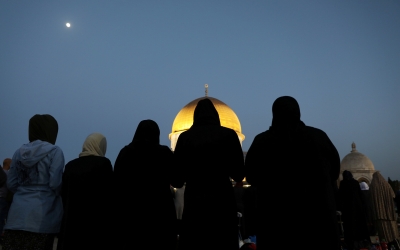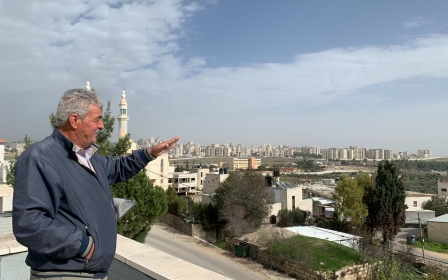Israel to build settlement units in East Jerusalem for first time during Biden presidency

Israel on Wednesday approved the construction of hundreds of illegal settlement units in occupied East Jerusalem, a first since US President Joe Biden took office in January.
The proposed 540 housing units are to be built in the Palestinian neighbourhoods of Beit Safafa and Sharafat, and create territorial continuity between the two major settlements of Har Homa and Givat Hamatos south of East Jerusalem, Israeli newspaper Haaretz reported.
Israeli settlements in occupied Palestinian territories are illegal under international law, and have previously been criticised by Biden as "eroding" prospects of a two-state solution.
Israel's Jerusalem municipality said on Wednesday that the local planning and building committee had approved the construction in Har Homa, which will consist of 12- and 30-storey residential towers. The complex will include road and transport infrastructure and new public spaces.
Moshe Leon, the head of the Israeli Jerusalem municipality, said in a statement that it was "a great day for Jerusalem… especially for the young families".
"I am happy and proud to place another stone of Zion on the way to building Jerusalem."
The village of Beit Safafa and the neighbourhood of Sharafat, both located just north of the Palestinian city of Bethlehem in the occupied West Bank, were occupied by Israel in the 1967 Middle East war, and are now home to some 25,000 Palestinian residents of East Jerusalem.
Settlement building across these neighbourhoods would further curtail any chance of splitting Jerusalem as part of a two-state solution privileged by the international community. While Palestinian leadership has sought a solution to the occupation with East Jerusalem as the capital of a future Palestinian state, Israel claims the entirety of Jerusalem as its capital.
In Donald Trump's last days in the White House, Israel took advantage of the staunchly pro-Israel stance of the outgoing president to push construction in Har Homa, Givat Hamatos and Atarot.
Ethiopian-Israeli and Russian-Israeli Jewish settlers have since settled in mobile homes in the 170-dunam (42-acre) area, which is served by Israeli public transport.
Splitting West Bank in half
Biden has said that his administration would restore US opposition to settlements, after his predecessor Trump recognised Jerusalem as the capital of Israel in December 2017 and went on to announce in November 2019 that his administration no longer considered Israeli settlements in the occupied West Bank to violate international law.
Under Barack Obama's presidency, the US administration had asked the Israeli government to freeze the construction of 1,800 settlement units in Ramat Shlomo in 2010 and 2,610 illegal settlement units in Givat Hamatos in 2014.
Ahead of the Israeli elections in March 2020, Israeli Prime Minister Benjamin Netanyahu announced that he planned to authorise the construction of some 3,500 homes for Jewish settlers.
'(The) advancement of the plan is worrying news for those who thought that the change of administrations in the US would force Israel to restrain construction in the settlements'
- Aviv Tatarsky, Ir Amim
The Israeli government plan, known as E1, involves building hundreds of units to link the settlements of Kfar Adumim and Maale Adumim with East Jerusalem in the Israeli-controlled Area C of the West Bank.
Critics have said the plan would effectively split the West Bank in half, isolate East Jerusalem from Palestinian communities in the West Bank and force Palestinians to make even lengthier detours to travel from one place to another while illegal settlements would be able to expand.
Aviv Tatarsky, director of Ir Amim, an Israeli civil society organisation that tracks settlements in Jerusalem, told Haaretz that the “advancement of the plan is worrying news for those who thought that the change of administrations in the United States would force Israel to restrain construction in the settlements”.
“Either way, further construction beyond the Green Line does not solve any of the real problems of the binational reality that exists in Jerusalem and between the Jordan [River] and the [Mediterranean] Sea,” he added.
Settlement construction approvals in Ramat Shlomo in 2010 caused a major rift between Netanyahu, Obama and his vice president, Biden.
The US State Department has been contacted by Middle East Eye for comment.
Middle East Eye delivers independent and unrivalled coverage and analysis of the Middle East, North Africa and beyond. To learn more about republishing this content and the associated fees, please fill out this form. More about MEE can be found here.





